|
Our
feature today is an
atmospheric and moody little pot-boiler
from our old friends at American
International Pictures that's based on --
what else? -- a poem by Edgar Allan Poe.
It's the story of a young sailor who is either falling in
love with- or falling under the spell of a
displaced mermaid -- well, maybe she is,
maybe she isn't -- who, while under the
influence of the moon tides, must fight
off her bloodlust against the ones she
loves. Will true love win out? Will she
return to the sea? Or will she feast?
Two men have already died trying to find
out. Will there soon be a third? (...This
one's for you, Cliffie!)

While
out on his first weekend liberty, young
sailor Johnny Drake (Dennis
Hopper) explores the sights and
attractions of the
local Amusement Pier. Following his
nose into a bar, where
a jazz combo is cutting a mean groove (--
and as a litmus test of the film's
quality, the music in here is actually
pretty good), Johnny gets a beer, and
while taking in the bar patrons, perhaps
looking for another lonely soul to spend
the evening with,
he spots a pretty raven-haired girl, bobbing to the music, and
takes a chance. Using the awkward
approach, that proves to be genuine (--
not a come on), Johnny takes a seat
at her table and tries to make small talk.
But the girl is more interested in the
music -- until
she spots an older woman, dressed in
black, spying on them. The old bird then
approaches, says something in a foreign
tongue that only the girl understands, and this
encounter spooks her so much that she
abruptly departs, leaving the bewildered
Johnny behind. But he quickly goes after her,
under the hateful gaze of the old witch,
and when he catches up to the girl,
swearing he only wants to walk her home,
it being so late at night and all, she
agrees to the escort. Upon reaching her
apartment, that's located above the pier's
giant Carousel, Johnny thinks it's
an odd place to live, but the girl claims
to find the attraction's music soothing. (Frankly,
that calliope music would make me stark
raving bonkers.) Totally smitten, pathologically
shy Johnny musters enough bravery to get the girl's name, Mora (Linda
Lawson), and with that revelation,
he steals a kiss. At first, Mora is taken
aback by this move, but after a quick
apology, does agree to see him again for a
late breakfast, tomorrow, and finally
manages a smile before Johnny returns to his
ship.
Our
eager boy arrives early the next morning, just
as the merry-go-round opens up for the
day. He meets the owner, Walter Sands (Tom
Dillon), and his plucky granddaughter,
Ellen (Luana Anders), and
when Johnny mentions his impending date
with Mora, the gregarious proprietors quickly
turn suspicious at the mere mention of her
name. Weirded out by this reaction, and
with no real explanation for it, Johnny
moves on to Mora's apartment -- that's
definitely got an under-the-sea motif
going, judging by all the crap she's got
tacked up on the wall. Her breakfast of
fresh mackerel(?) is ready, and they eat
it out on the balcony, where Mora goes on
and on about the delicacies of the sea --
something a Colorado boy like Johnny knows
little about but would love to learn. As
they eat, the couple exchange life
stories: Johnny is an orphan, who joined
the Navy to see the world; Mora,
meanwhile, is a little more cryptic about
her past, but presently, she is a mermaid by trade
in one of the sideshows at the Amusement
Pier. In fact, she has to go to work soon and
explains to Johnny how it works,
through trickery, with a fake tank (--
and there's another illusion shattered.
First wrestling, and now this.)
While Johnny is anxious to finish up and
see her in her costume, their breakfast is
suddenly interrupted by several low
altitude seagulls; one of which lands in
front of Nora, who cradles the wild sea
bird to her breast.
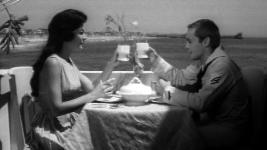
After
breakfast, the curious couple heads over to the
pier and the "Mora the Mermaid" rostrum,
where they find the proprietor, Captain
Sam Murdoch (Gavin
Muir) -- an old salt
who puts the yo-ho-ho in the bottle
of rum, if you know what I mean -- asleep
behind the barker's stand. Once
they wake him up, Mora goes to get
ready, leaving Murdoch, a retired Royal
Navy man, to swap sea stories with Johnny.
But the older man is disappointed when
Johnny doesn't have any, and when the
young sailor asks about Mora, Murdoch
suddenly gets a bad case of mumble-mouth
after revealing he found the girl on a
remote island during his travels. Before
he can say more, Mora calls from the
inside that she's ready. (That
was quick. Too quick?) Murdoch is
then bitten by the cryptic bug, but
invites Johnny to his house later,
promising to finish up- and explain the "unusual"
story of Mora's origin then. With that,
Johnny heads into a small, darkened
chamber that is empty except for a large
tank in the center, with the only light
source coming from the illuminated aquarium. When Johnny
approached and peers inside, through the
water, he can see Mora lounging on the
aquarium floor, casually stroking her hair
as it drifts around in the water -- which,
come to think of it, kinda contradicts her explanation on how
the mermaid hoax works...

Producer
Val Lewton and director Jacques Tournuer
started a whole new horror sub-genre in
the 1940's for RKO Pictures, with a string
of movies that
were long on mood and atmosphere that relied
more on suggestion than actual spooks.
They were kind of a Nuevo Gothic, bringing
old fashioned monster movie trappings,
mixed with a little noir flare, but set them in
modern times.
I
find it amazing that all these new
horror conventions that Lewton and
Tournuer are credited for were, for the
most part, the result of budgetary
restraints -- also the reason they
seldom had a monster.
Many
tried to copy the success of that formula;
most ultimately failed. Allied
Artist made the most failed attempts: see
Bert I. Gordon's Tormented
as the wonkiest example. And by the time
the late '50s and '60s rolled around, all
that was left of the genre was whatever
gimmick picture William Castle was turning
out at the time. Once in a while, though,
there'd come along a no-budget thriller
that milked those new conventions for all
they were worth. Shot on actual locations,
a kind of commando filmmaking, that only
added to the mounting surrealism, these
films just got under your skin and spooked
you, spooked you good, and left you grasping for the exact reasons why.
Herk
Harvey's Carnival of
Souls, I think, is the best example
of this. That movie is a delirium to me; a
fever dream, and as you watch it, especially
the first time through, something just
isn't quite right about it and you can't
lock the movie down. Strange visuals,
weird angles, the illogic logic, and just
the general starkness of the whole thing
is unnerving. Is what you're seeing real?
When does the dream end? Hell, When did it
start? What? Then, when the ending provides all
the answers to those doubts and questions,
you just have to tip your hat to the
production for being able to tweak you
that effectively. I think it's a fantastic
film, but that movie has no business being
as good as it is.
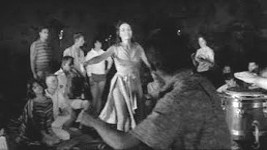
Meanwhile,
over at American International Pictures, Roger
Corman had found another diamond in the
rough for Nicholson and Arkoff in
writer/director Curtis Harrington, who,
after
making a couple of short experimental
films, made his feature film debut with Night
Tide. And to be honest,
it's a pretty impressive, no-budget
psychodrama whose creepy, eerie, earnest
and sincere elements strikes a strange alchemy
that once again is hard to comprehend, let
alone explain. Of course, that doesn't
mean I won't try as we
pick things back up when Johnny's next weekend pass rolls
around. And after he and Mora head to the beach, where they
have a picnic, Mora wants to go swimming.
When Johnny says they have to wait at least
a half-hour for their food to digest, a
confused Mora's never heard that tip before;
seems she's
never had any trouble in the water. (Cue
ominous sting!) While
they wait, the subject switches to Captain
Murdoch as Johnny wants to know what their
relationship is. Mora claims he's just an
old friend -- her only friend. When Johnny
asks What about him?, Mora grows afraid,
not wanting to admit they're growing
close, for some reason, and asks if
Murdoch said anything strange about her.
After Johnny assures her he didn't, Mora
regroups and says Murdoch found her,
orphaned, on the Greek Isle of Mikolos. He
later adopted her and she
joined him in his world travels until they
eventually settled here. Then Mora gets
even more enigmatic when she talks about her
longing for the sea, claiming to be drawn to it
and yet terrified of it at the same time.
Johnny admits "We're all afraid of
what we love", and with that
statement, the two embrace and go for a
roll in the sand ... Later,
the two are drawn to a raucous beach
party. When the bongo player asks Mora to
dance for them, she appears to be
possessed by the beat -- but her frenzied
act ends when she spots the old woman in
black again, which immediately causes Mora to
collapse. Quickly, Johnny moves to help her. He saw the old
woman, too, but she's mysteriously
disappeared before he can get any answers.
The
next morning, Johnny goes to visit Mora
but is intercepted by the
Merry-Go-Rounders, who invite him in for
some coffee. They have another guest,
Madame Monosomethingorother (Marjorie
Eaton), a fortune teller from up
the pier, who invites Johnny to come for a
free reading. Then another
guest joins them, a police detective, and
our story gets even murkier and murkier
when the others praise the officer for not
giving up, and after asking if any new clues have
surfaced, they finally clue Johnny [and us]
in that Mora's last two boyfriends died under mysterious circumstances: both
disappeared, and then eventually washed up on
shore. Finally realizing why everyone was acting
so suspicious, Johnny can't believe that Mora
would have anything to do with it.
Suddenly, the phone rings. It's for Johnny, which is odd
because no one knows he's there. (Damn
telemarketers.)
But when he takes the receiver, no one is
there. He spies the old woman lurking
nearby and gives
chase; but every time Johnny almost
catches up to her, the old bird magically
winds up about twenty yards ahead of him
again. Once more he catches up, rounds a
corner, but the woman has disappeared again. However, by
coincidence, by machination, or just plain dumb luck,
Johnny's chase lands him at the door of
Captain Murdoch's home. When Murdoch
invites him in, Johnny marvels at all the
treasures and oddities he picked up during
his travels, including the severed hand of
an Arab thief. Cool knick-knacks aside, Johnny
really wants that promised story about
Mora. To which Murdoch is very blunt, and warns
Johnny that he is in grave danger and must
break off the relationship as soon as
possible. When Johnny gets defensive,
Murdoch says the danger's not from him --
but from Mora! Who will
eventually be overcome with a compulsion
to kill the one she loves. Thinking Murdoch is drunk and
overprotective of his daughter, Johnny
still listens as the old
salt continues, talking about the myth of
the Sirens, who lured sailors to their doom
with their beauty and voice. Murdoch then spews
ironically that his sideshow is the
perfect place to hide Mora; in plain
sight. He rants on, claiming he didn't
know what she was, or was to become, when
he found her; a monster. Then, Murdoch
babbles about an ancient race from the sea
who are after her, wanting to bring Mora
home. As the quarter drops, Johnny asks
Murdoch about the mystery woman in black.
Denying knowing any such woman, all
the booze finally catches up and
the old man passes out.
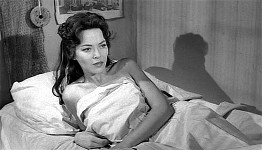
Confronting
Mora with all he's heard that day, to his
surprise, the
girl doesn't deny any of it and claims she didn't
tell him in fear that he would leave her.
When Johnny assures her that he believes none
of it and will stick by her, Mora is
envious of Johnny's wide-eyed naiveté;
but she's convinced the old woman is one
of the sea people, sent to bring her back.
On this point, Mora is torn. She feels the seawater in her veins, and
the changing tides pull at her --
especially on the nights of the full moon.
Believing the sea calls to her, Mora
fights this longing because she doesn't
want to leave Johnny. Holding her tight,
he promises that,
together, they can beat this malediction
and things will work out.
After
Mora goes to work, Johnny visits Madame
Monowhatshername and the clairvoyant makes
things even more complicated when she
breaks out the Tarot cards ... She emphasizes
the moon card, with the crab that tries to
crawl out of the water only to fail. When
he asks about Mora, Madame
Morowhattheheckareyoutalkingabout says she
is caught up in a "vortex of
evil" but warns Johnny that he's the
one in real danger. Unsure of what to do, the fortune teller
tells Johnny the answer lies in your heart (--
and
that'll be two dollars.) Later,
when Johnny returns to Mora's apartment,
she's
just gotten in the tub so he stretches
out on the couch for a quick nap. But just as
he closes his eyes, he hears Mora
approaching, soaking
wet, wrapped in a soggy bathrobe. They embrace. They
kiss. But then Johnny
notices Mora has a tail! And her hands
have suddenly turned into tentacles! Then Johnny screams
as the sea monster envelopes and strangles
him...

...But
it was all a dream, and when Johnny wakes up,
Mora is gone. Following her wet footprints
outside to the beach, he calls to her. She
answers from underneath the pier, where
the tide
is rapidly coming in. Johnny spies her by the
pylons, and with the surf crashing dangerously
around her, the boy rescues her and takes
her back inside, where she sobs that the
siren call of the sea is getting stronger
and she won't be able to resist it for much longer.
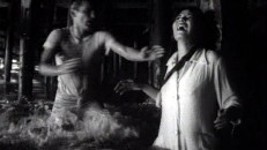
Wanting
to help her fight this thing that
compels her, Johnny goes AWOL to stay and protect her.
His trepidation has her worried, so she
sends him to a local masseuse to ease up.
And while Johnny gets a rubdown, Murdoch
winds up on the next table, from which he
asks if Mora has been acting more odd
lately. He also warns the
boy to
be extra careful because there's a full moon
tonight, and reiterates that Johnny should
never see her again ... Upon his return to
the apartment,
Johnny finds Mora in good spirits.
Convinced that she was just sleepwalking
the night before, she now firmly believes that
he's been right all along and all that sea people nonsense is just that --
nonsense. To celebrate, the girl wants to take
Johnny on a dive to her favorite spot, and
then ominously states that conditions are
perfect -- the full moon tide is just
right. Recalling Murdoch's warning, a
waffling Johnny
makes up all kinds of excuses. (Is
he starting to believe?) But he
finally agrees to do it when Mora says
it's very important to her. (The
big dope.)
While
taking
a boat to Mora's spot, Johnny's starts
to get a little paranoid, but Mora puts him
at ease as they don their gear. But before
they go over the side, Mora warns Johnny
to stay very close to her. Now, I'm
honestly not sure what happens next; the
print of the film I have is pretty dark
and the underwater scenes are almost
unwatchable. So, I think Mora takes a
knife and slices Johnny's air hose, and as
he frantically kicks for the surface and pulls himself into the boat,
Mora watches from below and then swims away,
toward deeper water and the open ocean.
Above, Johnny waits for Mora to surface. And waits. And
waits...

Long
after her air would have run out, Johnny
finally heads back in and holes up in a
hotel to hide from the Shore Patrol.
Plagued by more bad dreams, including a
vision of Mora the mermaid slipping back
into the sea, like the crab on the Tarot
card, when he wakes up, with Madame
Monowhatsowhosits voice still ringing in
his ears, Johnny sees an article in the
morning's paper about the Amusement Pier
celebrating its 20th Anniversary;
including a paragraph highlighting the
sideshows.
Mora
the Mermaid is still open for business.
Wanting
answers, Johnny sneaks by Murdoch -- whose
call to come and see Mora seems different
... like it was missing something.
(He
typed ominously...) Entering the
darkened room, our boy waits until a few kids clear out
then approaches the illuminated tank. And when he
peers inside, he quickly recoils: Mora is
floating on the surface of the tank,
unmoving, and obviously quite dead. And that's
the part Murdoch was leaving out -- he was
no longer calling Mora a
"living mermaid." Speaking
of Murdoch, gun in hand, he orders Johnny to move away
from the tank and accuses him of murder. Johnny
swears he didn't do this. He loved her. But
Murdoch isn't listening and takes several shots at Johnny, who tips
the tank over, spilling it's morbid contents onto Murdoch and they all land in a
twisted heap.
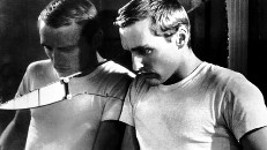
Which
leads us to the dénouement.
The
attempted shooting alerted two passing patrolmen,
who then haul both suspects to jail. As the detective
escorts Johnny into the interrogation
room, Murdoch stops him ... Wanting to make a
full confession, but only if Johnny is
present, the old man admits that he was the one who
killed Mora's other two boyfriends. He
also swears that everything he did was out
of love of Mora. He always saw her as the
little orphan girl who was solely dependent on
him, and to keep it that way, he convinced
Mora that she really was a Siren to prevent her
from loving anyone else. It worked, for a
while, but as Mora grew up and wanted her
independence, to keep her in line, he killed the
others and convinced the impressionable girl that she did
it without even realizing it.
But
his plan worked too well. Seems Mora was going
to kill Johnny during their diving
excursion, but in the end, she couldn't do it. To save
him, Mora cut his air hose, so he couldn't
stop her when she tried to return to her
"people." And
I'm gonna assume she drowned and Murdoch
found her, washed ashore, and tried to make
things the way they were by putting her
back on
display -- since the movie kind of left that
part up to us to interpret. But Johnny
doesn't think Murdoch is telling the whole
truth, and believes the old man had an
accomplice -- namely, the old woman in
black. When Murdoch still
denies knowing anything about her, the detective
figures he's just trying to protect her. (The
film is real ambiguous here, too. Who was
this lady? Who knows for sure.)
With that, Murdoch is hauled off to a cell
and the SP's show up to haul Johnny back
to base.
The
End
| It
was many and many a year ago, |
| In
a kingdom by the sea, |
| That
a maiden there lived whom you may
know |
| By
the name of Annabel Lee; |
| And
this maiden she lived with no
other thought |
| Than
to love and be loved by me. |
| I
was a child and she was a child, |
| In
this kingdom by the sea; |
| But
we loved with a love that was more
than love- |
| I
and my Annabel Lee; |
| With
a love that the winged seraphs of
heaven |
| Coveted
her and me. |
|
| And
this was the reason that, long
ago, |
| In
this kingdom by the sea, |
| A
wind blew out of a cloud, chilling |
| My
beautiful Annabel Lee; |
| So
that her highborn kinsman came |
| And
bore her away from me, |
| To
shut her up in a sepulcher |
| In
this kingdom by the sea. |
|
| The
angels, not half so happy in
heaven, |
| Went
envying her and me- |
| Yes!
- that was the reason |
| (as
all men know, |
| In
this kingdom by the sea) |
| That
the wind came out of the cloud by
night, |
| Chilling
and killing my Annabel Lee. |
|
| But
our love it was stronger by far
than the love |
| Of
those who were older than we- |
| Of
many far wiser than we- |
| And
neither the angels in heaven
above, |
| Nor
the demons down under the sea, |
| Can
ever dissever my soul from the
soul |
| Of
the beautiful Annabel Lee. |
|
| For
the moon never beams without
bringing me dreams |
| Of
the beautiful Annabel Lee; |
| And
the stars never rise but I feel
the bright eyes |
| Of
the beautiful Annabel Lee; |
| And
so, all the night-tide, I lie down
by the side |
| Of
my darling- my darling- my life
and my bride, |
| in
the sepulcher there by the sea, |
| In
her tomb by the sounding sea. |
|
|
|
--
Edgar Allan Poe |
Wow,
that's a real bummer, dude. Seriously.
Whoa
... Whoa ... Slow down ... Come back. Sit down.
Sit. Now Stay. No,
I haven't turned this website into a
poetry appreciation society, I just wanted
to post the poem, Annabel
Lee,
to show how much of a rarity the
movie Night Tide
really is. You see, when it comes to American International's
adaptations of Edgar Allan Poe, H.G. Wells
and other well known authors, "based on" basically
meant, for the most part, that they shared
the same title -- and that was about it.
But Night
Tide actually shows some strong
inklings toward its source material and it's
amazing how the haunting refrain of love
found, love lost, and then the sometimes
fatal consequences of finding it again -- especially when your girlfriend might be
an octopus monster, comes through in the
film.
Harrington's
screenplay, here, was inspired by Poe's poem (--
and
at this point in time I think it was a
prerequisite for all of AIP's pictures),
then mixed it with a little Greek Mythology
and a dash of ancient Lovecraftian genetic hiccups-n-family tree
issues to spice things up. Sounds convoluted,
right? Right. But the resulting film is actually
a taught, no-nonsense mind-bender as
everything
supernaturally suggested is also given a
perfectly rational explanation -- but ... But. But. But. Maybe
Mora really was a
mermaid who must kill her lover during the
full moon. And who was that mystery woman
in black? Who knows, as Night Tide is just ambiguous enough that
anything remains a possibility until the
very end when
the truth is revealed. And yes, that pat ending
kinda let me down, too. And
I suppose, technically, Night
Tide is another one of those
monster-less monster movies. Sure there
was the octopus scene, that comes off
rather silly and clumsy, but the scene was
absolutely necessary for the narrative to
work. It just falls a little short of
expectations due to budget restraints,
though I'm sure audiences back in 1961
were more than a little hacked by their
misleading expectations, thanks to lurid
and misleading advertising campaign. (Yet
another tried and true AIP trick.)
One
thing that really helps the film is the
solid efforts of the cast. Star
Dennis Hopper had plenty of experience as
a bit player before Night
Tide, but this was his first time
as the headliner. Those of you used to his
manic performances will probably be amazed by his
subdued performance as the lovelorn
Johnny. He just brings such a
naturalness to Johnny that helps ground
the film -- and his normalcy also helps to
make all the weird
stuff around him all the more creepy.
Linda Lawson also shines as the earnest
but ultimately doomed Mora, who would never find the
feature success of her co-star but would
have a solid career on tube.
As
for Harrington? Well, he was one of those
genre directors who probably should be
more well known than he is, I think. He's one of those gray area guys whose work
was neither good enough nor bad enough to
leave a true (skid)mark, and as a result,
kinda gets lost in the shuffle. When Night
Tide was first released, TIME
magazine tagged it as one of thee films to
see for 1961. Unfortunately, despite this
endorsement, no one saw it. Seems the
film's budget couldn't afford union wages,
and without the proper certification, the
film was unofficially blackballed and
quickly faded from circulation. After Night
Tide, Corman set Harrington to work
writing scripts that could be wrapped
around the F/X from several imported
Soviet science-fiction films, including Planeta
Bur, Nebo
zovyot and
Mechta
Navstrecha. Harrington went on to
direct inserts for Voyage to a
Prehistoric Planet, and teamed up with
Hopper again for Queen
of Blood -- both films mostly consisting of
that footage pilfered from the Bolsheviks.
After that was a couple of mild,
modern-day
gothic thrillers starring Shelley Winters,
What's the Matter
With Helen and Whoever
Slew Auntie Roo, and one outstanding
-- albeit very disturbing, character piece
on what makes a serial killer a serial
killer with The Killing Kind. When
none of these films caught fire at the
box-office, Harrington was soon relegated
to Movies of the Week for the boob-tube, like
The
Killer Bees and
Devil
Dog: The Hound of Hell, along with a lot of
conventional episodic TV on several varied
programs. The last feature film he worked
on was another Grande-Damme feature, Ruby,
a blatant Exorcist knock-off, where
Harrington butted heads with his meddling
producer so much that he eventually had
his name stripped from the credits.
But
with the possible exception of The
Killing Kind, none of his later films managed to match his
eerie first effort; though he seemed to be
trying really hard to do just that in a
lot of them. Perhaps too hard, in some
cases. And if
Night Tide
has one fault it's that Harrington seemed
to be so concerned with creating and
maintaining the film's moody mood, the film almost chokes on it.
Couple that with an ending that just
sputters out, it keeps Night Tide from being
considered a Cult Classic in the same
breath as Carnival
of Souls. It's real close. But still not
quite.
|